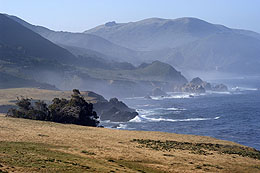|
February 16, 2004
STEPS Institute holds second workshop on Central
Coast biodiversity
By Tim Stephens
Researchers studying the biodiversity of California's Central Coast
gathered at UCSC on February 6 for an all-day workshop hosted by the
STEPS Institute for Innovation in Environmental Research. Participants
included researchers in a range of disciplines at UCSC, as well as representatives
of federal and state agencies and nongovernmental organizations.
| The STEPS
Institute for Innovation in Environmental Research web
site has been redesigned to include links to environmental and
environmentally related departments, institutes, centers, and core
facilities throughout campus. |

The Santa Lucia Range, rising steeply from the Big Sur coast,
is one of the most environmentally complex and biologically rich
areas of the state. Photo: John Thompson
|
As part of a project called the Santa Lucia Gradient Study (SLGS),
the STEPS Institute is helping to coordinate a network of researchers,
managers, and policy makers concerned with issues of biodiversity along
the Central Coast.
The SLGS project focuses especially on patterns of biological diversity
in the environmentally complex area extending from the coastal waters
of Big Sur, across the Santa Lucia Range, to the Carmel Valley.
Speakers at the workshop discussed a wide range of research efforts
on the rapidly changing diversity of fish, birds, mammals, insects,
and plants along the Central Coast.
John Thompson, professor of ecology and evolutionary biology and director
of the STEPS Insitute, described the institute's progress on compiling
a "meta-database" of Central Coast biodiversity research.
The meta-database is essentially a database of databases--it doesn't
hold any data, but aims to provide a comprehensive source of information
about the data that are available and where they can be found.
"There is a lot of valuable data out there, and it is not necessarily
on someone's computer. It could be on loose-leaf notebooks from the
1920s," Thompson said.
Phillip Hoos, a staff researcher at STEPS who is managing the meta-database
project, has been traveling up and down the coast visiting researchers
and going through file drawers and storerooms, sometimes turning up
forgotten troves of information, Thompson said.
"It's remarkable how little access there is to all the data out
there. What we are doing is pretty simple, but this kind of information
has been almost impossible to find in one place. We're just getting
started on the meta-database, and it is already being used by people
in the SLGS group," he said.
The SLGS project is part of the STEPS Institute Genes to Ecoregions
Initiative, which is facilitating interdisciplinary collaborations among
researchers, policy makers, and managers working on biodiversity issues.
The goal of the initiative is to link innovative ecological and molecular
research questions and methods with the needs of policy makers and managers.
The project was launched at a previous STEPS workshop held last year.
Thompson said that both workshops have led to new collaborations among
the participants.
The February 6 workshop included representatives from the U.S. Forest
Service, National Marine Fisheries Service, Monterey Bay Aquarium Research
Institute, The Nature Conservancy, Wildlife Conservation Society, UC
Berkeley, Elkhorn Slough Foundation, Big Sur Land Trust, Santa Lucia
Conservancy, and Big Sur Ornithology, among others.
The STEPS Institute was established at UCSC in 2002, funded by a gift
from UCSC alumnus Gordon Ringold and his wife, Tanya Zarucki. The institute
is leading a campuswide effort to facilitate and strengthen interdisciplinary
collaboration among UCSC environmental researchers and other researchers,
policy makers, and managers throughout the region and state.
Return to Front Page
|